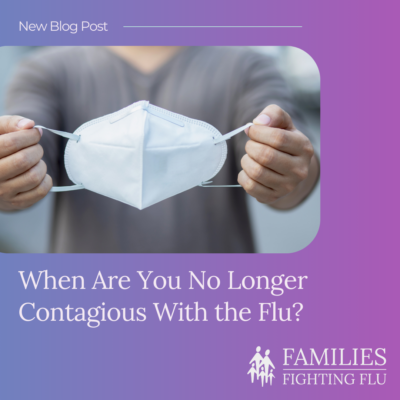
- Flu Prevention
When Are You No Longer Contagious With the Flu?

With at least 14 million illnesses estimated so far this flu season, the chances that you or someone you know has contracted the flu this winter are high. The prevalent respiratory illness tends to make its presence felt during colder months. While it may feel unavoidable, understanding when you are no longer contagious with the flu can be a key factor in mitigating how easily it spreads to your friends and family.
Below, we’ll explore the timelines of flu contagion and emphasize the importance of taking preventive measures, especially for vulnerable populations like pregnant individuals.
How Contagious is the Flu?
The flu is a highly contagious respiratory illness that spreads easily from person to person. The virus primarily travels through respiratory droplets released into the air when an infected person talks, coughs, or sneezes. These droplets can land in the mouths or noses of people nearby and potentially be inhaled into their lungs.
People with flu are most contagious in the three to four days after their symptoms start but what makes the flu highly contagious is that the contagious period typically begins about 24 hours before symptoms first appear and can last up to seven days after becoming sick. Since you may be contagious before and after showing symptoms, it’s easy to see how flu can spread so quickly—some people, especially children and people with weakened immune systems, may even remain contagious for a longer duration.
Preventive measures, such as getting a flu shot, practicing good respiratory hygiene, and staying home when sick, can curb transmission and protect vulnerable populations.
The First Line of Defense is Getting a Flu Shot
One of the most effective ways to prevent the flu and reduce its contagiousness is by getting a flu shot. Even if you’ve received a flu vaccine in previous flu seasons, influenza viruses can mutate and change over time, leading to the emergence of new strains. This means that each flu season, the predominant strains may vary, so the flu vaccine is updated annually to target the most prevalent strains.
Getting vaccinated ensures that you are protected against the specific viruses circulating during that particular flu season, extending protection to yourself, as well as vulnerable populations like infants and elders.
Testing and Treating Are the Next Steps
While getting a flu shot is the first line of defense, it’s also important to acknowledge that not everyone may choose this preventive measure. The next line of defense in fighting the flu becomes recognizing flu symptoms early and getting tested by a healthcare provider so an appropriate treatment can promptly be prescribed.
When those tested know they are sick they can properly treat their symptoms with antiviral drugs that, if taken within 48 hours of symptoms starting, can shorten the duration of illness.
Testing can be completed at most medical facilities, including clinics, doctors’ offices, urgent care centers, and pharmacies.
Protecting Two Lives with One Vaccine
Research has shown that getting vaccinated during pregnancy not only lowers the risk of flu-related complications for the expectant mother but also provides protection for the newborn during the first few months of life. This is especially important because newborns are more susceptible to severe flu complications. Pregnant individuals should strongly consider getting a flu shot as a powerful shield against the virus for themselves and their babies.
Read more about getting the flu vaccine during pregnancy here.
Knowledge is a powerful weapon in the battle against the flu. Understanding when you are no longer contagious empowers you to take responsible actions to protect yourself and those around you. Whether it’s getting a flu shot or adopting a timely testing and treatment approach, every step counts in preventing the flu’s impact on vulnerable populations. Let’s work together to ensure a healthier, safer winter flu season for everyone.
Learn More About Families Fighting Flu
Founded in 2004, Families Fighting Flu (FFF) is a national, nonprofit, 501(c)(3) advocacy organization dedicated to protecting children, families, and communities against the flu through education about the seriousness of influenza. Our organization includes families whose loved ones have suffered serious medical complications or died from influenza, as well as other advocates and healthcare professionals committed to flu education and prevention.
In honor of our loved ones, we work to increase awareness about the seriousness of the disease and to reduce the number of hospitalizations and deaths caused by the flu each year by increasing vaccination rates for everyone six months and older. Learn more about our mission and resources here so that you can empower your family to stay healthy this flu season.


